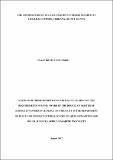The Contribution of Oil Exploration on Human Security in Lokichar Division, Turkana County, Kenya

View/
Date
2017Author
Zephaniah, Lagat Kiptoo
Type
ThesisLanguage
enMetadata
Show full item recordAbstract
After decades of exploration, commercially viable quantities of oil were hit in Kenya’s Turkana
County in 2012. This made Kenya join the regional and international list of countries with
commercially viable oil reserves. This research aimed at discerning the influence of oil
exploration on human security in Lokichar Divisi on of Turkana County. The study set out to
examine how human security in Lokichar Division is affected by displacement of populations,
environmental degradation, socio-cultural and infrastructural development as a result of oil
exploration. The research used a descriptive design by administering both structured and open
ended questionnaires to 181 respondents and conducted 3 focus group discussions to a total of
51 individuals who live and/or work in Lokichar area. The sample was arrived at through
simple random sampling to select questionnaire respondents and purposeful sampling to pick
key FGD respondents. The data collected was analysed and presented through descriptive
statistics. Tables and frequencies were used in interpreting the feedback from respondents. The
accuracy, reliability and completeness of the data collected for the purpose of the study w as
determined using a pilot study and expert opinion. Data analysis and interpretation was
conducted using the SPSS software version 20.0. To analyse the data into information that can
be used to make conclusions and recommendations, the researcher used descriptive statistics
for measures of central tendency for groups of subjects. This was done after authority was
granted by the administration of the Nazarene University and the National Commission for
Science, Technology and Innovation (NACOSTI). The research found that population
displacement exercises in Lokichar Division were rife according to 84.44% of the resi dents.
There was minimum effort by the oil exploration companies to follow up to ensure that
livelihoods of affected residents were reconstructed after displacement. Oil exploration also
affected the ecosystem in Lokichar Division, thus creating an imbalance that has been a source
of conflicts and human insecurity according to majority of residents. Oil exploration ha s also
led to the destruction of the local culture and heritage thus making the local communities feel
insecure. Infrastructure development has contributed to the expansio n in infrastructure,
increased police presence, opening up of areas that were previously difficult to access and has
increased access to basic services such as food, health and security. The hypothesis was tested
using a multiple regression analysis of the four explanatory variables associated with oil
exploration that affect security: forced displacement, environmental degradation, socio cultural
influence and infrastructural development. The tests were done at a significance level of 0.05.
The findings of the study revealed that R
2
= 0.360 which implied that 36.0% of human security
of residents of Lokichar Division was explained by the oil exploration. The regression was
significant at p = 0.000. T his implies that the oil exploration activities in Lokichar significantly
contributed to the human security situation in the region. It established that environmental
degradation and forced displacement in Lokichar significantly influenced the security situation
in the region negatively while social cultural changes and infrastructural development had
impact on human security but there seemed to be both positive and negative impac ts thus the
net effect was less.
Publisher
Africa Nazarene University
